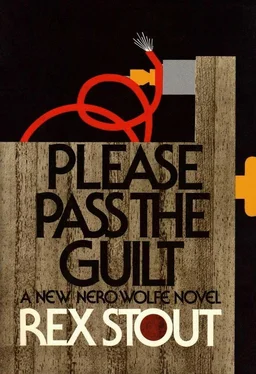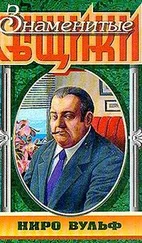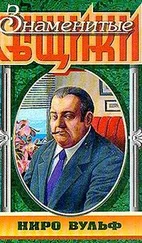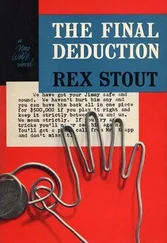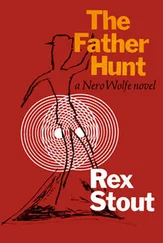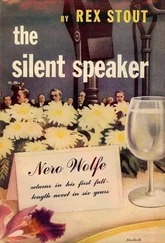“The Friday before it happened. Four days before.”
“That was May sixteenth.”
“Was it?” It took her only a moment, not a long one, to figure it. “That’s right. May sixteenth.”
“You phoned him at what hour?”
“Around nine o’clock. A little after nine. When I thought he would have finished dinner.”
“How sure are you it was Mr. Browning?”
“Oh, quite sure. He answered the phone himself, and I know his voice. I have heard him on the phone at least a dozen times, when he has called Mr. Odell at home.”
Wolfe regarded her. “And you didn’t tell Mrs. Odell you had warned him.”
“Of course not.”
“But you did tell her, three days after Mr. Odell died. Why?”
“Because — well, I had to. I said I didn’t want to be a murderer, but I was one. If I hadn’t made that phone call, Mr. Odell would still be alive, and maybe Mr. Browning would too. The LSD might not have hurt him at all. To go right on being with Mrs. Odell every day — I had to tell her.”
Wolfe turned to the prospective client. “That was two weeks ago. Why haven’t you dismissed her?”
“That’s a silly question,” Mrs. Odell said. “She might tell anyone. She might tell the police. I’m not hiring you to analyze what Miss Haber has done — or what I have done. I want to know how we can make Browning pay for what he did without telling what we did.”
Wolfe closed his eyes, and the forefinger of his right hand started making little circles on his desk blotter. But he wasn’t tackling a tough one; his lips didn’t move. So he had made his decision and was merely considering whether he should ask more questions before announcing it. In half a minute he quit making circles, lifted his hand to give his forehead a rub, and swiveled to look at me. If they hadn’t been there he would have put it into words: “You got me into this. I concede the desirability of a fee, but you got me into this .”
Having looked it, long enough to count ten, he swiveled back to her. “Very well. It’s an impossible job, but I’ll accept the retainer. My fee will be based on effort and risk, not on accomplishment. I’ll need facts, many facts, but it’s nearly dinner time, and anyway I want them at first hand. Archie, list these names: Mr. Browning. Mr. Abbott. Mr. Falk. Mr. Meer. Mrs. Browning. Miss Lugos. Miss Venner.” Back to the client: “Will you have those people here tomorrow evening at nine o’clock?”
She stared at him. “I will not. How can I?”
“I don’t know, but it shouldn’t be too difficult. They were associates of your husband, who was murdered. They should be willing to help you learn who murdered him, and you are concerned at the lack of progress in the official investigation and have engaged my services. Shouldn’t they sacrifice an evening at your request?”
“They might. I don’t want to ask them. And I won’t.”
Wolfe picked up the check and held it out. “Take it. You have wasted your time and mine. You want a miracle, and miracles are not in my repertory. Give me the receipt.”
“My god,” she said, “you are highhanded. What can they tell you?”
“I don’t know, and I need to know. If there is a fact that will help me do what you want done, I want it. If you think I may inadvertently disclose what you have told me, even a hint of it, if you think me capable of such ineptitude, you were a ninny to come to me at all.”
She was chewing her lip. “Is this the only — do you have to do this?”
“If I take the job as you defined it, yes.”
She looked at me, and saw only an open, intelligent, interested, sympathetic phiz.
“Damn it,” she said. “Give me the list.”
Since the state of the bank account had been responsible for the state of my nerves for at least six weeks, it might be supposed that ten o’clock Monday morning would find me at the door of the Continental Bank and Trust Company, waiting for it to open so I could deposit the check, but I wasn’t. I knew darned well that Wolfe would not be firmly and finally committed until Mrs. Odell came through, and I couldn’t blame him. Of the people on the list I had given her, there wasn’t one that he could tell me to go and bring with any right or reason to expect me to fill the order, and if he expected to fill her order, he had to get some questions answered, and not just by her and Miss Haber. So it was possible that the twenty grand would have to be returned, and if so, it would be neater to return her check than to deposit it and then have to draw one of Wolfe’s.
And at four o’clock Monday afternoon, it became about ten to one that she was going to get her check back. She had done fine with the invitations; she reported by phone that all of them had said yes. The hitch was that when she told me she would come a little early, around half past eight, I had to tell her, as instructed by Wolfe, that he had decided she shouldn’t come at all. She wasn’t invited and wouldn’t be admitted. So she blew her top. I tried to explain why, but she wouldn’t listen. She commanded me to get Wolfe to change his mind and ring her, and if she hadn’t heard from me by four-thirty, she would tell them not to come. I went to the kitchen to tell Fritz I was going on an errand, ran, not walked, to the garage on Tenth Avenue where the Heron sedan that Wolfe owns and I drive is kept, made it to Sixty-third and Madison in nineteen minutes, probably a record for that time of day, and was inside the Odell mansion at 4:28. If I reported that conversation verbatim you would think I was tooting my horn, so I’ll merely say that I sold her. I explained that when Browning told lies, as he surely would, if she was there she would almost certainly horn in, and if she expected Wolfe to get results she would have to let him do it his way. Also, of course, if she told them not to come, the deal was off and she would have to find someone who would do it her way, and obviously she didn’t have any or she wouldn’t have gone to Wolfe and given him a check for twenty grand. She didn’t like it, but she lumped it.
Then, leaving, I got a break. I had had to double-park, on Sixty-third Street, and it was a pleasant surprise to see that no city employee had happened by to put a ticket on the windshield. The return trip took thirty-one minutes. When Wolfe came down at six o’clock and I reported, he didn’t even say “Satisfactory.” He merely scowled and rang for beer. His outlook was bleak. It was now settled that he was going to have to work, and with an obstreperous female for a client.
They all came. The first to arrive, Sylvia Venner, showed a little before nine, and the last, Kenneth Meer, at 9:08. Cass R. Abbott rated the red leather chair on two counts: he was the president of CAN, and, being close to seventy, he had seniority. So I put him there. For the others I had placed two rows of yellow chairs facing Wolfe’s desk. I have a sort of rule that when there is company and one of them is, or is supposed to be, a murderer, the place for him or her is the front row nearest to me, so that was where I put Amory Browning. Next to him was his wife, and then Theodore Falk. In the back row Kenneth Meer was in the middle, with Helen Lugos on his right and Sylvia Venner on his left. The only one I had ever seen before was Kenneth Meer. When I let him in, he had looked me in the eye and asked, “More tricks?” and I said, “No, and we have made no use of that one. If anyone here knows about your bloody hands, he didn’t learn it from us.”
Since you’re meeting them, you should see them. Cass R. Abbott, the president, looked like one. The mop of well-tended white hair, which he had a right to be proud of and probably was, was a good cap for the well-arranged, long, pale face. Amory Browning, who would soon be president if he wasn’t otherwise engaged, didn’t rate it on looks. If he was fifty-two, which would have been my guess, he had probably been pudgy for about five years, and he would be bald in another five. Theodore Falk, the Wall Street Falk, was about the same age, but he had kept himself lean and limber and had a deep tan. He probably played tennis. You have already seen Kenneth Meer’s long, pointed nose and wide, square chin.
Читать дальше
